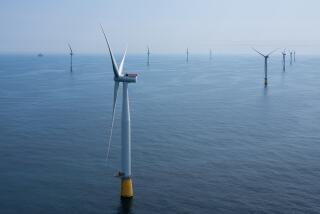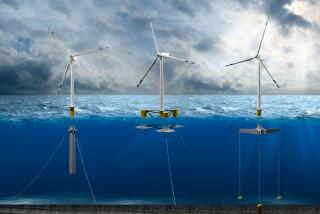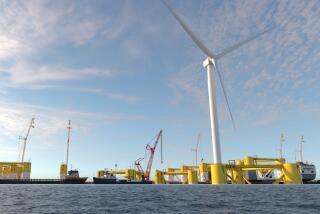More movement on renewable energy
- Share via
With California’s mandate to have 20% of its energy needs met by renewable sources by 2010, more technology is being developed to harness energy from the ocean. Finavera Renewables in Vancouver, Canada, is developing a buoy that generates electricity from wave action. PG&E; recently signed a contract to purchase power from the company’s proposed site off Humboldt County. It will deploy eight buoys initially and produce 2 megawatts of power (enough for 1,500 homes) with plans to increase that to 100 megawatts.
How movement of the buoy generates electricity
Water inside a closed system of tubes and hoses within the buoy cylinder uses the rise and fall of the buoy in the waves to keep a constant flow moving through a turbine, creating electric current.
The hose pump action
1.Wave action causes piston to move down within the buoy cylinder.
2. Hose is stretched and lengthened, reducing its diameter. This forces water up and through the turbine. The process reverses when the buoy moves in the opposite direction.
--
A field of buoys
Fully developed projects would deploy a large number of buoys that are linked to each other and connect to the power grid on land by a single undersea and underground cable.
--
Power links
All the units are connected and power is transferred through underground “umbilical” cables.
--
Undersea cable
Cable runs along the sea floor and connects buoy field to an onshore power station through an underground cable.
--
Land station
Regulates the power for distribution to the local electricity grid.
--
Transmission transformer
Steps up voltage to reduce energy loss during transmission.
--
Proposed wave energy projects
For now, most of the company’s projects are in the proposal/permitting stages. A prototype was deployed off Newport, Ore., last year.
Ucluelet, British Columbia
Size: 5 megawatts initially.
Status: Investigative Use Permit granted.
--
Makah Bay, Wash.
Size: 1 megawatt demonstration project.
Status: In final stages of licensing; power purchasing agreement in place.
--
Humboldt County, Calif.
Size: 8 buoys and 2 megawatts initially, with plans to scale up to 100 megawatts.
Status: Power purchasing agreement in place; planned for 2 megawatts, to expand to 100 megawatts.
--
Western Cape, South Africa
(not shown)
Size: 20 megawatts.
Status: Assessing sites and permits.
--
Sources: Finavera Renewables, PG&E;
--
Recent regional explainer graphics are available at latimes.com/localgraphics
--
Matt Moody Los Angeles Times
More to Read
Sign up for Essential California
The most important California stories and recommendations in your inbox every morning.
You may occasionally receive promotional content from the Los Angeles Times.










